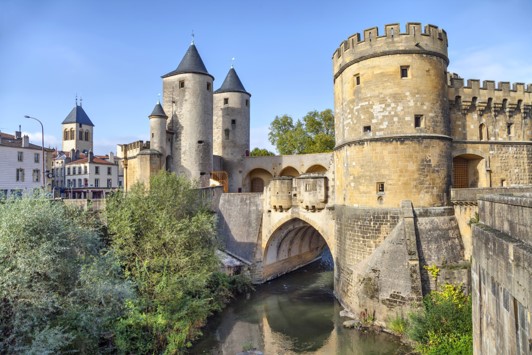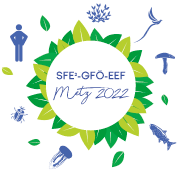|
|
|
Workshop & Mentoring

Workshops 2-4h Monday (21/11/2022)
W1: An introduction to modeling and synthesizing Integral Projection Models using the R packages ipmr and Rpadrino.
Monday 21 November, 14:00-18:00 - Room 8
Number of attendees: 15 max
Requirements:
-
Basic knowledge of R.
-
Familiarity with (any type of) structured population models.
-
Basic knowledge of linear regression models.
-
Knowledge of Integral Projection Models is beneficial, but not expected.
Organizers of the workshop:
Sanne M. Evers
Helmholtz Centre for Environmental Research
|
Martin Andrzejak Helmholtz Centre for Environmental Research
Sam Levin Helmholtz Centre for Environmental Research
Dr. Tomos Potter Florida State University
Dr. Dylan Childs University of Sheffield
|
Dr. Aldo Compagnoni Helmholtz Centre for Environmental Research
Dr. Tiffany M. Knight Helmholtz Centre for Environmental Research
Dr. Roberto Salguero-Gómez University of Oxford |
Workshop description:
One of the most important tools when studying population dynamics are structured population projection models. Integral Projection Models (IPMs) for example have become increasingly popular in the last two decades. IPMs are ideal for studying populations that are structured (at least in part) on a continuous variable, such as height or weight. Moreover, IPMs are incredibly flexible. IPMs can include both discrete and continuous stages, and demographic processes can be modelled with any type of (regression) model appropriate for the model population. However, this very flexibility has made it increasingly difficult for researchers to implement the models, as well as synthesize across populations, species and studies. In this workshop we will introduce two new R packages designed to help researchers overcome these challenges.
After a general introduction to IPMs, participants will be introduced to ipmr, an R package designed for building, analyzing and interpreting IPMs. ipmr is designed to reflect the mathematical notations of IPMs, stepping away from the idiosyncrasies of the R language. As such, the step from theory to implementation becomes a lot smaller.
Finally, we will introduce the new package Rpadrino. This package is used to access the new IPM database, PADRINO. Using Rpadrino the user can select, reconstruct and extend peer-reviewed IPMs in the PADRINO database. Users will be able to use published IPMs to ask new questions, conduct syntheses with peer-reviewed IPMs and will be able to easily combine their own (ipmr built) IPMs with those already in PADRINO. Finally, Rpadrino’s frame work also allows users to easily combine the models in PADRINO with other types of structured population models in other databases such as DATLife (life tables) and COMPADRE & COMADRE (matrix population models).
W2: Transfer of anthropogenic stress from aquatic to terrestrial ecosystems – perspectives from young researchers
4h Monday 21 November, 14:00-18:00 - Room 11+12
Number of attendees: 50 max
Organizers of the workshop:
Ralf Schulz Prof. Dr.
University of Koblenz-Landau, Institute for Environmental Sciences, Landau, Germany
schulz@uni-landau.de
Martin Entling Prof. Dr.
University of Koblenz-Landau, Institute for Environmental Sciences, Landau, Germany
entling@uni-landau.de
Workshop description:
The close connection between aquatic ecosystems and adjacent terrestrial land has been a long-standing paradigm of ecological research. Existing concepts, however, mainly focus on the terrestrial input into freshwater ecosystems and the consequences for aquatic life. The flux of resources and pollutants from aquatic to terrestrial systems or the role of invasive species in this context has been less studied. Recently intensified research revealed that material fluxes mediated, e.g., by emerging insects and flood events, are of high ecological relevance, particularly for the receiving ecosystem. In addition, these fluxes are increasingly affected by anthropogenic and climatic stressors, such as micropollutants, invasive species, and hydrological alterations. The workshop invites contributions from all aspects of resource and stressor transfer from aquatic to terrestrial ecosystems and the ecological responses in the terrestrial recipient ecosystem. Although the workshop particularly aims to bring young researchers (Master or PhD students) in this area of research together, we also welcome participation by researchers at advanced career steps.
W3: Comparing non-systematic and systematic review methods for environmental evidence: an introduction to different literature review approaches, their advantages and limitations
4h Monday 21 November, 14:00-18:00 - Room 7
Number of attendees: 20 max
No specific requirements to declare – have a curiosity and interest for systematic approaches (introductory workshop)
Organizers of the workshop:
Joseph LANGRIDGE
La Fondation pour la Recherche sur la Biodiversité (FRB),
joseph.langridge@fondationbiodiversite.fr
Dr. Nicola RANDALL,
Director of the « Centre for Evidence Based Agriculture » , Harper Adams University,
Mr. Ko Konno
School of Natural Sciences, Bangor University
afuaad@bangor.ac.uk
Workshop description:
Systematic reviews (SR) aim to answer questions using existing research evidence. They use structured predefined methods to identify, select and critically appraise relevant research. Systematic maps (SM) follow similar predefined methodologies, but instead of aiming to answer a question, provide overviews of the distribution and abundance of relevant evidence. Both are becoming increasingly popular in the scientific literature. Indeed, it can be challenging for the average reader, manager, or even researcher to make sense of the mass of existing scientific literature without it being treated in an objective and standardised way. Thus, there is an increasing recognition of the need for unbiased and comprehensive methods for either reviewing a body of evidence and/or specifically supporting ecological decision-making. SR are designed to minimise bias and provide robust results, which can resolve conflicting results across primary studies, and help bridge the gap between evidence and action.
This introductory workshop will cover different types of evidence synthesis, outlining the main steps of SR and SM from question formulation to the various possible outputs. The workshop will be a combination of presentations and activies.
Part 1: question settting, searching and inclusion - The importance of planning and scoping in the construction of pertinent questions for different types of reviews will be discussed, alongside search and selection strategies for included research.
Part 2: critical appraisal - This will cover the benefits of the critical appraisal of studies considered for inclusion in a systematic review.
Part 3: data handling - This section will introduce what decisions need to be made when extracting complex ecological data, and will consider the options for different types of synthesis.
Part 4: tools and resources - We will briefly introduce some tools and resources that can be used to support the process and dissemination of ecological systematic reviews, assisting users in appraising existing reviews.
W4: How to better manage your data - and thereby enrich research
4h Monday 21 November, 14:00-18:00 - Room 9+10
Number of attendees: 50 max
Organizers:
Tschink Daniel
GFBio - German Federation for Biological Data e.V.
Jimena Linares
NFDI4Biodiversity | GFBio e.V.
Dr. Ivaylo Kostadinov
NFDI4Biodiversity | GFBio e.V.
ikostadi@gfbio.org
Workshop description:
Today the volume, complexity, and creation speed of research data are rising exponentially. While the awareness of the value of environmental data has been increasing, we still face the problem that research data is getting more transient. The reasons are that data vary in quality, are stored decentrally with no long term perspective and are thus not findable or reusable for other researchers. Further, they are often not standardized in format nor described properly using common metadata standards. However, in order to leverage the full potential of existing data, researchers need to work together and share their data in order to gain insight into complex ecological processes. The vast resources of biodiversity-related data enable the opportunity for analysing complex processes on larger scales and in an interdisciplinary manner. Furthermore, research institutions and funders, but also publishers increasingly demand transparency and promote data sharing practices. In order to make data FAIR - F indable, A ccessible, I nteroperable, and R eusable ( www.force11.org/group/fairgroup/fairprinciples)-, 'good' research data management is needed. NFDI4Biodiversity is part of the National Research Data Infrastructure, Germany. We boost research and support nature conservation by providing access to tools, and services for handling biodiversity and environmental data and to support good research data management.
This workshop is divided into three sections. In the first section, we will teach the basics of research data management for ecologists across the whole data life cycle. Section two will then focus on the “first step” in the data life cycle – planning a research project. This section addresses the importance of a data management plan with practical examples. In the last section, we will share our experiences in the consortium NFDI4Biodiversity. This section will offer insight into one of the tools/services provided by our partners.
W5: e-Tools and resources to address key ecological questions on Non-indigenous and Invasive Species
4h Monday 21 November, 14:00-18:00 - Room 13
Number of attendees: 25 max
Type of Workshop:
A 4-hour computer-based workshop run by LifeWatch ERIC ICT staff, in collaboration with scientists already engaged in developing research activities on non-indigenous and invasive species using LifeWatch ERIC’s Virtual Research Environment facilities. Interested attendees (max 25) will be trained to access and use the Virtual Research Environments from their personal computers. The hands-on session will be introduced by an interactive session to guide the attendees on their first approach to the VREs and related e-tools.
Organizers of the workshop:
Juan Miguel González-Aranda
LifeWatch ERIC
Christos Arvanitidis
LifeWatch ERIC
Alberto Basset
University of Salento & LifeWatch ERIC
Peter van Tienderen
University of Amsterdam & LifeWatch ERIC
Workshop description:
Non-indigenous and Invasive Species (NIS) are considered one of the major threats to the ecosystem functioning and one of the main drivers of biodiversity loss. Despite the advances in the understanding of introduction pathways, mechanisms of bio-invasions, and impacts of invasive species, the effective management and control of NIS still lag behind their spread. For such reason, the LifeWatch ERIC has developed e-science tools to assist researchers, stakeholders, and citizens in deepening knowledge and obtaining rapid responses to mitigate the risks and impacts of NIS in the terrestrial and aquatic domains.
This joint effort has resulted in the development of a series of ICT facilities and workflows to support scientist in running five case studies (CS) on NIS, tackling different key aspects, including: 1. the evaluation of their trophic habits (CS 1); 2. the early-detection of NIS invasion and spread, through standard monitoring procedures and metabarcoding (CS 2 & 3); 3. the development of keystone NIS species dispersion scenarios for terrestrial Mediterranean ecosystems (CS 4); and, 4. the EUNIS habitat and ecosystem vulnerability (CS 5). The five case studies and workflows are embedded into Virtual Research Environments (VREs) that provide a series of web-services made available through a user-friendly interface and the datasets and services produced through the case studies are accessible through the LifeWatch ERIC catalogue.
The workshop aims at presenting the LifeWatch ERIC VREs and e-resources developed for NIS research. During the workshop, the scientific case study leaders, together with the LifeWatch ERIC ICT team, will introduce the aims and analytical tools (e.g. models, computing facilities) included in each workflow. The presentation of the case studies and web-services realised will be followed by a hands-on session where the attendees can access the VREs.
W6: Who owns my data? On our way to open data - Nagoya and beyond!
2h Monday 21 November, 14:00-16:00 - Room 2
Number of attendees: 50 max
Organizers of the workshop:
Juliane Röder
Philipps-Universität Marburg
Marlen Fischer
NFDI4BioDiversity/Philipps-Universität Marburg
marlen.fischer@uni-marburg.de, co-moderator
Dr. Ortrun Brand
NFDI4BioDiversity/HeFDI/Philipps-Universität Marburg
Dr. Daniel Tschink
NFDI4BioDiversity/GFBio
Workshop description:
In order to gain insight into complex ecological processes and the consequences of anthropogenic impact on the worlds ecosystems, researchers need to work together and share their data. The vast resources of biodiversity-related data combined with socio-economic, trade, financial data will allow to improve models of the state, stability and threats to ecosystems - but only if data is FAIR. Consequently, research institutions and funders, but also publishers increasingly demand transparency and promote data sharing practices. However, sharing data often touches national and international law such as handling sensitive data (e.g. occurrence data of endangered species). Thus, it is often noticed as challenging and complex.
In our workshop, we will hear about and discuss open (biodiversity) data at national and global scales: Lawyer Louisa Hantsche (UfU) will introduce the basics of copyright protection, data policies and licensing. She will also elaborate on how national legislation, such as the Umweltinformationsgesetz in Germany, will boost research and support nature conservation by providing access to monitoring data from assessment reports, e.g. monitoring of bats before and after wind mills were installed. Microbiologist Dr. Amber Scholz (DSMZ) will present the ongoing discussion whether digital sequence information (DSI) are subject to the Nagoya protocol, and why the answer to this question could have severe effects on global research. Afterwards, we will discuss the challenges and opportunities of open biodiversity data in breakout rooms, and collect ideas to improve access to open data training and resources.
W7: Telling ecological stories through photography
2h Monday 21 November, 14:00-16:00 - Room 3
Number of attendees: 50 max
Organizers of the workshop:
Dangles Olivier
IRD, Montpellier
Nowicki François
CEREMA
Workshop description:
As the saying goes: a picture is worth a thousand words. This also applies for scientific messages, in particular in ecology. By illustrating ideas, raising consciousness, stimulating curiosity, and firing emotions, photography is a powerful mean to convey scientific findings. Yet, what are the secrets of a good story telling picture? Ecologist Olivier Dangles and wildlife photographer François Nowicki share their experience and passion.
Some publications: https://www.editions.ird.fr/auteur/464/olivier-dangles

Workshops 1hr – lunch break
W8: Career outside academia
Tuesday 22 November lunch - 12:45-13:45 - Room 2
Number of attendees: 40 max
Organizers of the workshop:
Pierre Quévreux
INRAE, France
Julia Clause
Université de Poitiers, France
julia.clause@univ-poitiers.fr
& young ecologist group of the SFE²
The post-PhD period is often complicated because academia does not offer jobs for all PhDs. Many opportunities exist but they are often seldom known to early career ecologists. Come and discuss with speakers who started a career outside academia after their PhD. This session will focus on exchanges with participants after a short presentation (5-10 min). We encourage attendees to watch the video on the same topic that was produced during the SFɲ -AEET online joint conference (June 2021) before the conference to get additional discussion materials ( https://bit.ly/3IRdrvK ). Among speakers, Sébastien Rochette, who holds a PhD in Ecology and now works as a trainer and consultant in R programming (ThinkR), has already accepted our invitation.
W9: Promoting your research
Tuesday 22 November lunch - 12:45-13:45 - Room 11+12
Number of attendees: 40 max
Organizer:
Rowena Gordon
BES
rowena@britishecologicalsociety.org
Workshop description:
You've produced a great piece of research and now the world needs to hear about it! In this interactive workshop you’ll learn how to find the newsworthy hook in your research and some straightforward tips for how to write engaging blogs and press releases to share your research with a wider audience, including other researchers, the general public and the media.
W10: Phenology-trait relationships in plants across different scales
Wednesday 23 November lunch - 12:45-13:45 - Room 7
Number of attendees: 15 max
Organizers of the workshop:
Robert Rauschkolb
Friedrich-Schiller-University Jena
robert.Rauschkolb@uni-jena.de
Christine Römermann
Friedrich-Schiller-University Jena
christine.Roemermann@uni-jena.de
Workshop description:
We live in a rapidly changing world and scientists from different disciplines are studying how phenology and functional traits of plants are related to their environment, and how they respond to environmental changes. However, this work is often carried out on very different spatial, temporal, and organisational scales and can be investigated with precisely collected data in the field, but also with large, partially modelled, data sets. Aim of this one-hour workshop, organised by the PhenObs-network, is to bring field ecologists, macro-ecologists and modelers together to integrate their expertise in phenology-trait relationships and climate on different spatial, temporal and organisational scales. Though this is planned as a follow-up meeting of an international workshop carried out at the iDiv in Leipzig (Germany) in September 2022, we are looking for further collaborations and committed scientists from the above-described fields joining our team.
In the first part of this workshop, we will report on the main results of this international workshop, aiming to develop a better understanding of the following two broad questions:
1.) Investigating the impact of the environment and its variability on phenology-trait interactions on different spatial scales
2.) Comparing space-for-time substitution approaches with historical data to predict phenology changes
In the second part, we want to discuss and evaluate with the participants to what extent they can contribute their expertise and knowledge to publications within a planned special issue.
If you have the feeling that you could make a substantial contribution to this workshop, please register via phenobs@uni-jena.de . Should you have any further questions, please do not hesitate to contact us.
W11: Impostor syndrome
Wednesday 23 November lunch - 12:45-13:45 - Room 11+12
Number of attendees: 40 max
Organizers of the workshop:
Pierre Quévreux
INRAE, France
Julia Clause
Université de Poitiers, France
julia.clause@univ-poitiers.fr
& young ecologist group of the SFE²
Many researchers suffer from impostor syndrome, and early career ecologists are no exception. We want to bring to light that many people are concerned and thus encourage people to speak out in a safe environment. Anonymous testimonies will be collected before the conference through collaborative tools such as Mural ( https://www.mural.co/ ), to break the ice and feed the discussion. Mentoring researchers attending the conference will comment on the testimonies, share their own experience and answer the questions of the attendees.
W12: From raw biodiversity data to operational indicators through Essential Biodiversity Variables
Wednesday 23 November lunch - 12:45-13:45 - Room 2
Number of attendees: 40 max
Organizers of the workshop: To be determined
Olivier Norvez
Fondation pour la Recherche sur la Biodiversité & Muséum National d’Histoire Naturelle
|
Sandrine Pavoine Muséum National d’Histoire Naturelle
Yvan Le Bras Muséum National d’Histoire Naturelle
Aurélie Delavaud Fondation pour la Recherche sur la Biodiversité aurelie.delavaud@fondationbiodiversite.fr
|
Jean-Baptiste Mihoub Sorbonne Université jean-baptiste.mihoub@sorbonne-universite.fr
Coline Royaux Sorbonne Université & Muséum National d’Histoire Naturelle
Dominique Pelletier Ifremer |
Workshop description:
Because data integration with different ecological scales in biodiversity science is complex, the biodiversity community (scientists, policy makers, managers, citizen, NGOs) needs to build, a framework of harmonized and interoperable data from raw, heterogeneous and scattered datasets, in order to observe, measure and understand the spatio-temporal dynamic of biodiversity from local to global scale. One of the most relevant approaches to reach that aim is the concept of Essential Biodiversity Variables (EBV). Because we can potentially extract a lot of information from raw datasets sampled at different ecological scales, the EBV concept represent a useful leverage for identifying appropriate data to be collated as well as associated analytical workflow for processing these data. Thanks to FAIR data and source code implementation (Findable, Accessible, Interopability, Reusable), it is possible to make transparent assessment of biodiversity by generating operational indicators through the EBV framework, and help designing or improving biodiversity monitoring at various scales.
Based on the EBV, the French biodiversity data hub (“Pôle National de Données de Biodiversité” - PNDB ), is an e-infrastructure for and by researchers developing an integrated framework for 1) extracting EBV information from raw data using Ecological Metadata Language , (EML), 2) running reproducible ecological analysis through open-access workflows, and 3) producing biodiversity indicators for research, expertise and policy makers thanks to the Galaxy-Ecology collaborative platform .
In line with both the GO FAIR initiative and the GEO BON network , the PNDB is proposing a case study to focus on i) advancing conceptual developments related to EBV, such as the complementarities between EBVs and Pressure-State-Response frameworks (e.g. DPsIR) or the improvement of the research/expertise interface, ii) implementing EBVs for and with various communities (scientific research, expertise and policy makers), and iii) operationalizing EBV based on existing technologies (EML, Galaxy-Ecology). All of this will benefit various communities of biodiversity scientists.
W13: Improving PhD supervision
Thursday 24 November, lunch - 12:30-13:30 - Room 11+12
Number of attendees: 40 max
Organizers of the workshop:
Pierre Quévreux
INRAE, France
Julia Clause
Université de Poitiers, France
julia.clause@univ-poitiers.fr
& young ecologist group of the SFE²
PhD supervision is based on a close relationship between students and their supervisors. When this relationship is dysfunctional, it can lead to great suffering. Directors of PhD programs from different universities will be invited to share their experience in dealing with PhD/Supervisor relationships and discuss the opportunities to improve the situation. The report of this session with be submitted for publication in SFE² “Regards” and The Conversation, and a more detailed version will be shared to scholarly societies and PhD programs.
W14: How to get published
Thursday 24 November, lunch - 12:30-13:30 - Room 2
Number of attendees: 40 max
Organizer:
Rowena Gordon
BES
rowena@britishecologicalsociety.org
Workshop description:
This is a workshop aimed at early career researchers which explains the how and why to publishing their research. We will explain the importance of publishing, how to write a scientific paper, finding your audience, how to select the right journal, what a decision from the journal means and how your paper gets published once accepted.

Mentoring
Asking questions to a plenary speakers is intimidating, especially in a crowded space where speakers are in high demand. We offer to create a specific moment of exchange between plenary speakers and early-career ecologists, right after their talk. Topics are open: research or career paths. Invited speakers who already gave their agreement for this event: Anne Charmantier (CEFE Montpellier), Jordi Cortina (University of Alicante) and Ralf Schäfer (University of Koblentz-Landau)
Organizers:
Pierre Quévreux
INRAE, France
Julia Clause
Université de Poitiers, France
& young ecologist group of the SFE²
M1: Free discussion with Anne Chamantier (Plenary 1)
Tuesday 22 November, morning coffee break (30 min - 9:45-10:15) - Room 13
Number of attendees: 40 max
M2: Free discussion with Jordi Cortina (Plenary 2)
Wednesday 23 November, morning coffee break (30 min - 9:30-10:00) - Room 13
Number of attendees: 40 max
M3: Free discussion with Ralf Schäfer (Plenary 3)
Thursday 24 November, morning coffee break (30 min - 9:30-10:00) - Room 13
Number of attendees: 40 max


